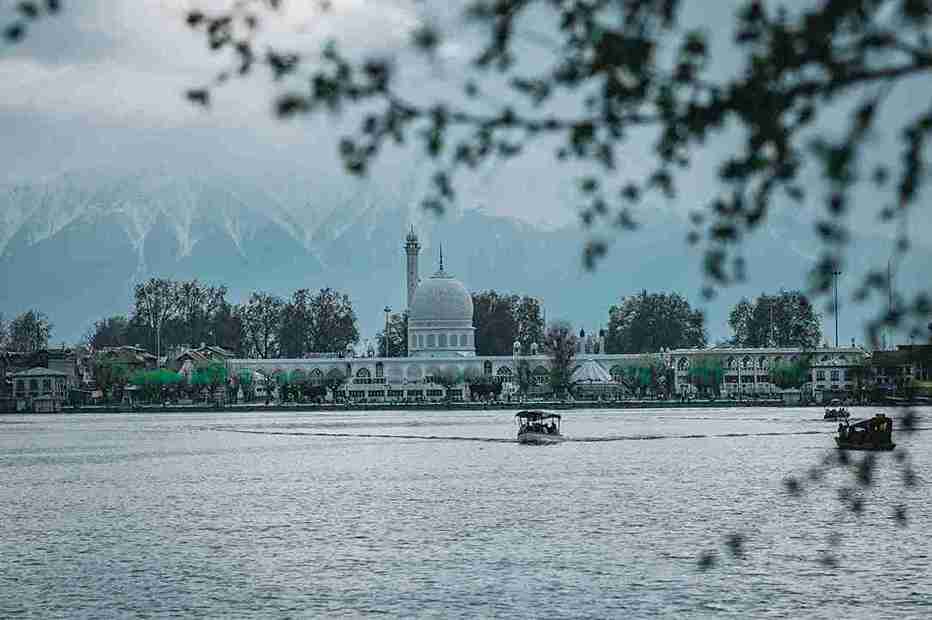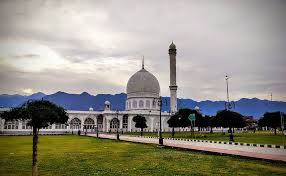Dargah Hazratbal Shrine | Srinagar | Kashmir


Located on the northern shores of Dal Lake in Srinagar, Dargah Hazratbal stands as the most revered Muslim shrine in Jammu and Kashmir. The shrine holds immense spiritual significance as it houses the sacred relic believed to be a strand of hair from the beard of Prophet Muhammad (PBUH), known as Moi-e-Muqaddas.
Beyond its religious importance, Hazratbal is admired for its serene setting — with the shimmering Dal Lake in front and the majestic Zabarwan Mountains as a backdrop. It attracts pilgrims and travelers alike, offering peace, devotion, and history in one destination.
History and Legacy of Hazratbal Shrine
The story of Hazratbal dates back to the 17th century, when Sadiq Khan, the Subedar of Shah Jahan, built a pleasure house called Ishrat Mahal in 1623. When Emperor Shah Jahan visited in 1634, he ordered it to be converted into a prayer hall, marking the beginning of its sacred journey.
The relic, Moi-e-Muqaddas, reached Kashmir through a fascinating journey. It was brought by Syed Abdullah Madani, a descendant of Prophet Muhammad. After several transfers and political events under Mughal rule, Emperor Aurangzeb eventually ordered the relic to be placed in Kashmir, where it found its permanent home in Hazratbal. The current marble structure was later completed in 1979 by the Muslim Auqaf Trust.
Architecture of Hazratbal Mosque
The Hazratbal Shrine is a masterpiece of Persian, Mughal, and Kashmiri architectural styles. Constructed from pristine white marble, it stands out for its unique single dome and minaret — the only one of its kind in Kashmir. The interiors feature intricate Persian calligraphy and motifs that reflect elegance and devotion.
- The mosque’s courtyard and lawns can host thousands of devotees during prayers and religious festivals.
- Women are allowed only in the front section of the shrine, while men access the main sanctum.
- During special Islamic occasions like the Prophet’s birthday, the relic is displayed publicly, attracting large gatherings.
Hazratbal Shrine Timings and Entry
- Opening Hours: 9:30 AM – 5:30 PM (every day)
- Entry Fee: Free for all visitors
- Dress Code: Modest attire required for both men and women
How to Reach Hazratbal Dargah
- By Air: The nearest airport is Sheikh Ul-Alam International Airport, about 19 km away.
- By Train: Nowgam Railway Station is the nearest, approximately 21 km from the Dargah.
- By Road: Taxis, cabs, and buses are available from Lal Chowk (10 km away) and other parts of Srinagar.
Nearby Attractions
- Dal Lake: Just beside the shrine, famous for Shikara rides and mesmerizing views.
- Nishat Bagh & Shalimar Bagh: Mughal gardens within a short drive.
- Hazratbal Market: Perfect for buying Kashmiri handicrafts, saffron, and dry fruits.
- Shankaracharya Hill: Offers panoramic views of Srinagar.
Best Time to Visit Hazratbal
Hazratbal is open year-round, but the best time to visit is between April and October, when Srinagar’s weather is pleasant and gardens are in full bloom. Winters (December–February) bring a peaceful charm, while spring and autumn (March–May, September–November) offer vibrant scenery around Dal Lake.
Things to Do at Hazratbal Shrine
- Attend Prayers: Experience spiritual devotion during daily congregations.
- Witness Relic Display: On select Islamic occasions, see the sacred relic displayed publicly.
- Photography: Capture the stunning view of Dal Lake and Zabarwan hills.
- Explore Local Markets: Shop for pashmina shawls, papier-mâché crafts, and spices nearby.
Unknown Facts about Hazratbal Shrine
- The Dargah is also known as Assar-e-Sharief and Madinat-us-Sani.
- It is the only domed mosque in Kashmir with a single minaret.
- It has been featured in Bollywood movies like Lamha (2010).
- The relic display draws one of the largest religious gatherings in the region.
Hotels Near Hazratbal
- Vivanta Dal View: Luxury stay with panoramic views of Dal Lake.
- Houseboats on Dal Lake: Traditional Kashmiri experience close to Hazratbal.
- Budget Stays: Available near Nigeen Lake and Hazratbal Market.
Travel Tips for Visitors
- Respect local customs and remove shoes before entering the prayer area.
- Photography is allowed outside but restricted inside the shrine.
- Plan your visit during Eid or Milad-un-Nabi for special ceremonies.
- Carry a scarf or shawl to cover your head inside the premises.
Fun Facts About Hazratbal
- Reflections of the mosque appear beautifully in Dal Lake on calm days.
- It can host thousands of devotees in its vast courtyard.
- The site was originally a Mughal pleasure house before becoming a mosque.
FAQs About Hazratbal Shrine
What is Hazratbal famous for?
Hazratbal is famous for housing the holy relic of Prophet Muhammad (PBUH) and its serene setting beside Dal Lake.
How far is Hazratbal from Srinagar city?
It is around 10 km from Lal Chowk and easily reachable by taxi or bus.
Can non-Muslims visit Hazratbal?
Yes, visitors of all faiths are welcome, provided they dress modestly and maintain decorum.
What is the timing of Hazratbal?
The shrine remains open daily from 9:30 AM to 5:30 PM.
What are the nearby attractions to Hazratbal Shrine?
Dal Lake, Shalimar Bagh, Nishat Bagh, Pari Mahal, and Shankaracharya Temple are close by.
Why is Hazratbal unique in Kashmir?
It’s the only mosque in Kashmir with a single dome and minaret, built entirely of white marble.
Why is Hazratbal Shrine famous?
Hazratbal Shrine is famous for housing the Moi-e-Muqaddas, a sacred relic believed to be a hair of Prophet Muhammad (PBUH). It is one of the most revered religious sites in Kashmir and holds special significance during Islamic festivals.
Can non-Muslims visit the Hazratbal Shrine?
Yes, non-Muslims can visit Hazratbal Shrine. Visitors are expected to dress modestly and respect local customs. Entry inside the main prayer hall may be restricted during prayer times or special religious occasions.
Who built the Hazratbal Shrine?
The Hazratbal Shrine was originally built in the 17th century during the Mughal era. Over time, it has undergone several reconstructions, with its present structure developed under the Jammu & Kashmir government.
Where is Hazratbal situated?
Hazratbal Shrine is situated on the northern shores of Dal Lake in Srinagar, Jammu & Kashmir. It is about 10 km from Lal Chowk and is easily accessible by road.
References
Plan Your Visit
Whether you seek spirituality, serenity, or culture, Hazratbal Shrine offers it all. Include it in your Srinagar itinerary and experience the sacred heart of Kashmir. Contact us for personalized Kashmir travel guidance.
Author: Aaqib Bhat | Travel Writer & Digital Marketer